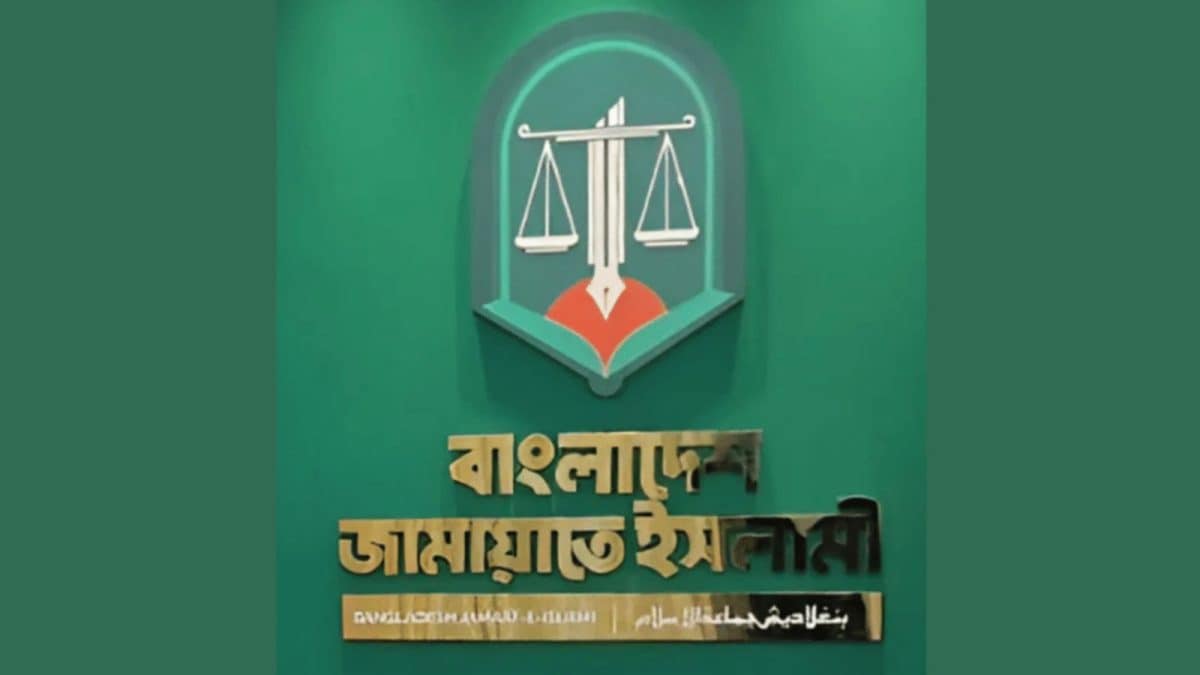Last Updated:
Sources also drew a parallel between Jamaat’s rebranding and the operations of Pakistan’s Jamaat-ud-Dawa (JuD) and Lashkar-e-Taiba (LeT)

Jamaat is working on a new emblem—a rising sun, a pen, and a balance scale placed on an open book, set against a green background. (Image/News18)
The recent decision by Bangladesh Jamaat-e-Islami (JI) to change its party logo—notably by dropping prominent Islamist symbols and Quranic text—is not a reflection of genuine ideological reform but a calculated move driven by significant pressure from Western nations concerned with “optics and legitimacy”, top intelligence sources have exclusively told CNN-News18.
Recommended Stories
The internal decision is an attempt by Jamaat to rebrand itself to secure international engagement and vital diaspora funding, which it fears could otherwise be targeted by terror-financing scrutiny.
Western Pressure for a Softer Posture
Intelligence sources indicate that key Western missions in Dhaka, including those from the European Union, Spain, the UK, and Germany, quietly pressured Jamaat to adopt a “softer posturing” by removing hardline Islamist symbols. The core message from the West is that a hardline Islamic agenda is viewed as anti-democratic, making the party unacceptable to the international community.
The West’s objective is a strategic one: to ensure a moderate Islamic political entity remains in the mainstream to serve as a counterbalance in Bangladesh’s political landscape following the fall of the Awami League government. The rebranding, which includes abandoning slogans like “Establish Islam”, is viewed by sources as nothing more than a “cosmetic surgery” to make Jamaat more acceptable in future political negotiations.
Funding and Geopolitical Balance
The financial dimension is central to the rebranding. Sources in Dhaka exclusively told CNN-News18 that the Western world is keenly interested in the “safety of diaspora funding” and sees Jamaat as a target for strategic funding to maintain a political balance in the country.
Terror-Finance Scrutiny: By shedding Islamist symbols and adopting a secular-friendly appearance, Jamaat aims to escape international terror-finance scrutiny, a crucial step given its dependence on funding from Europe, West Asia, and Malaysia. This strategy, sources suggest, could allow Jamaat to become a “hand” for Western interests in Bangladesh for both known and unknown reasons.
Diplomatic Push: The concept for the logo change was reportedly suggested to Jamaat by the Spanish Ambassador and other EU diplomats in 2024.
Sources also drew a parallel between Jamaat’s rebranding and the operations of Pakistan’s Jamaat-ud-Dawa (JuD) and Lashkar-e-Tayyaba (LeT), where JuD, the political front, is said to receive regular international funding, including diaspora funds, without the scrutiny faced by its radical counterpart. In a similar vein, Jamaat’s radical arm is expected to be carried by Hefazat-e-Islam to maintain the hardline religious image.
Ultimately, Jamaat’s gradual realisation that its long-term survival hinges on uninterrupted funding has made it amenable to rebranding according to “Western world” expectations, even as the Bangladesh Nationalist Party (BNP) remains the only major political partner willing to share votes with it. The West’s preference is for a visibly moderate Jamaat to sustain acceptability before foreign observers.
About the Author

Group Editor, Investigations & Security Affairs, Network18
Group Editor, Investigations & Security Affairs, Network18
October 03, 2025, 00:03 IST
Loading comments…
Read More



